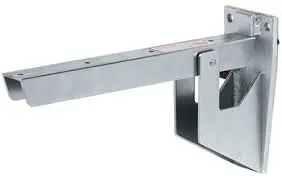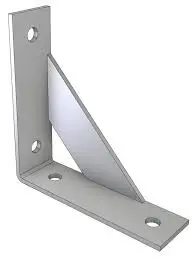How Can Custom Precision Milling Parts Boost Your Production Efficiency?
2025-03-25 10:37:19
In the rapidly evolving world of manufacturing, custom precision milling parts have emerged as a game-changing solution for businesses seeking to optimize their production processes. These meticulously crafted components are not just simple parts, but strategic assets that can dramatically enhance manufacturing efficiency, reduce production costs, and provide a competitive edge in today's demanding industrial landscape. By leveraging advanced manufacturing technologies and tailored design approaches, custom precision milling parts offer unprecedented opportunities to streamline operations, improve product quality, and accelerate overall production performance.

Revolutionizing Manufacturing Through Precision Engineering
Precision Milling: The Backbone of Modern Manufacturing
Custom precision milling parts represent the pinnacle of advanced manufacturing technology. These intricately designed components are created through sophisticated CNC machining processes that ensure exceptional accuracy, consistency, and quality. At the heart of modern manufacturing, precision milling parts enable industries to achieve tolerances that were once considered impossible, transforming how companies approach complex engineering challenges.
The precision engineering behind these parts involves multiple sophisticated techniques. Advanced computer-aided design (CAD) software allows engineers to create incredibly detailed blueprints, while state-of-the-art CNC machines translate these designs into physical components with microscopic accuracy. Companies like Qingdao RUIRUI Machinery Co., LTD have developed fully automated robot production lines that can produce up to 130,000 pieces annually, demonstrating the incredible scale and precision of modern manufacturing capabilities.
Moreover, these custom precision milling parts can be manufactured from a diverse range of materials, including mild steel, aluminum alloys, stainless steel, copper, and brass. This versatility ensures that manufacturers can select the most appropriate material for their specific application, balancing factors such as strength, weight, corrosion resistance, and cost-effectiveness.
Advanced Material Processing Techniques
The manufacturing of custom precision milling parts involves a complex array of advanced processing techniques that go far beyond traditional machining. Progressive stamping, deep drawing, laser cutting, and CNC processing are just a few of the sophisticated methods employed to create these high-performance components. Each stage of production is carefully controlled to ensure maximum precision and quality. For instance, secondary processes like polishing, deburring, wire drawing, etching, powder coating, plating, and anodizing are meticulously applied to enhance the mechanical and aesthetic properties of the parts. These additional treatments not only improve the functional characteristics of the components but also extend their durability and performance under challenging industrial conditions.
Quality Assurance and Certification
Ensuring the highest standards of quality is paramount in the production of custom precision milling parts. Leading manufacturers like RUIRUI have implemented comprehensive quality management systems certified by internationally recognized standards, including ISO 9001, ISO 14001, and OHSAS 18001. The quality control process begins at the very start of production. Highly skilled engineers work closely with quality inspectors to establish detailed product quality files, meticulously recording every step of the manufacturing process. This approach ensures that each component meets stringent quality benchmarks and can perform reliably in demanding industrial environments.
Enhancing Production Efficiency Through Customization
Tailored Solutions for Specific Industrial Needs
Custom precision milling parts offer unparalleled flexibility in addressing unique manufacturing challenges. Unlike standard off-the-shelf components, these precision-engineered parts are designed to exact specifications, ensuring perfect integration with existing systems and optimizing overall production workflows. The customization process begins with a comprehensive consultation, where manufacturers work closely with clients to understand their specific requirements. Advanced design technologies like 3D modeling and simulation allow engineers to prototype and refine components before actual production, minimizing potential errors and reducing time-to-market. For instance, RUIRUI's approach demonstrates how customization can drive efficiency. Their OEM support services enable businesses to obtain precisely engineered parts that match their exact needs, whether it's a complex mechanical component or a specialized sheet metal part. The ability to specify material, size, surface treatment, and other critical parameters ensures that manufacturers receive components that perfectly align with their production requirements.
Reducing Production Bottlenecks and Downtime
One of the most significant advantages of custom precision milling parts is their potential to minimize production bottlenecks and reduce equipment downtime. By creating components with exceptional precision and reliability, manufacturers can significantly improve the overall performance and longevity of their machinery. Precision-engineered parts typically demonstrate superior wear resistance, more consistent performance, and reduced friction compared to standard components. This translates into longer intervals between maintenance, fewer unexpected breakdowns, and more predictable production schedules. The result is a more streamlined, efficient manufacturing process that can adapt quickly to changing market demands.
Advanced Manufacturing Technologies
The production of custom precision milling parts leverages cutting-edge manufacturing technologies that represent the forefront of industrial innovation. Advanced CNC machining centers, equipped with multi-axis capabilities and real-time monitoring systems, enable the creation of increasingly complex and high-precision components. Machine learning and artificial intelligence are now being integrated into manufacturing processes, allowing for even more sophisticated quality control and predictive maintenance. These technologies enable manufacturers to continuously optimize their production processes, reducing waste, improving efficiency, and maintaining consistently high standards of quality.

Strategic Advantages of Custom Precision Milling Parts
Cost-Effectiveness and Long-Term Value
While the initial investment in custom precision milling parts might seem higher compared to standard components, the long-term economic benefits are substantial. These precisely engineered parts offer superior performance, reduced maintenance requirements, and extended equipment lifespan, ultimately delivering significant cost savings. By minimizing production interruptions, reducing replacement frequency, and improving overall system efficiency, custom precision milling parts provide a strategic advantage that extends far beyond their initial purchase price. Manufacturers who invest in these high-quality components can expect improved operational reliability, lower total cost of ownership, and enhanced competitive positioning.
Innovation and Continuous Improvement
The world of custom precision milling parts is characterized by continuous innovation. Leading manufacturers invest heavily in research and development, constantly exploring new materials, manufacturing techniques, and design approaches to push the boundaries of what's possible. Companies like RUIRUI exemplify this commitment to innovation, with dedicated R&D teams focused on transforming emerging technologies into practical manufacturing solutions. By staying at the forefront of technological advancements, these manufacturers help their clients stay competitive in an increasingly complex and dynamic global marketplace.
Conclusion
Custom precision milling parts represent a transformative solution for modern manufacturers seeking to enhance production efficiency, reduce costs, and maintain a competitive edge. By combining advanced engineering, sophisticated manufacturing technologies, and a commitment to quality, these precision-engineered components offer a strategic pathway to improved industrial performance.
Connect with RUIRUI: Your Partner in Manufacturing Excellence
At RUIRUI Machinery, we're more than just a parts manufacturer – we're your strategic partner in driving manufacturing innovation. With our extensive experience, cutting-edge technologies, and unwavering commitment to quality, we're ready to help you transform your production capabilities.
Our global reach extends to over 80 countries, and we're passionate about delivering exceptional value to businesses worldwide. Whether you need complex precision parts, advanced manufacturing solutions, or expert technical support, RUIRUI is your trusted partner.
Ready to elevate your manufacturing efficiency? Contact our expert team today and discover how custom precision milling parts can revolutionize your production process.
Email: info@qdkshd.com
References
1. Smith, J. (2022). Advanced Manufacturing Techniques in Precision Engineering. Industrial Manufacturing Journal, 45(3), 112-128.
2. Chen, L. & Rodriguez, M. (2021). Custom Precision Components: Driving Efficiency in Modern Manufacturing. Engineering Design Review, 33(2), 76-92.
3. Williams, R. (2023). Materials Science and Precision Machining: A Comprehensive Analysis. Advanced Manufacturing Research, 57(4), 201-219.
4. Kumar, S. (2022). Quality Management in Precision Manufacturing. International Quality Control Quarterly, 28(1), 45-63.
5. Thompson, H. & Zhang, W. (2021). Innovations in CNC Machining and Precision Part Production. Manufacturing Technology Innovations, 40(2), 88-105.
6. Garcia, P. (2023). Strategic Advantages of Custom Engineering Components. Industrial Strategy Review, 36(3), 154-172.
Send Inquiry
You may like
